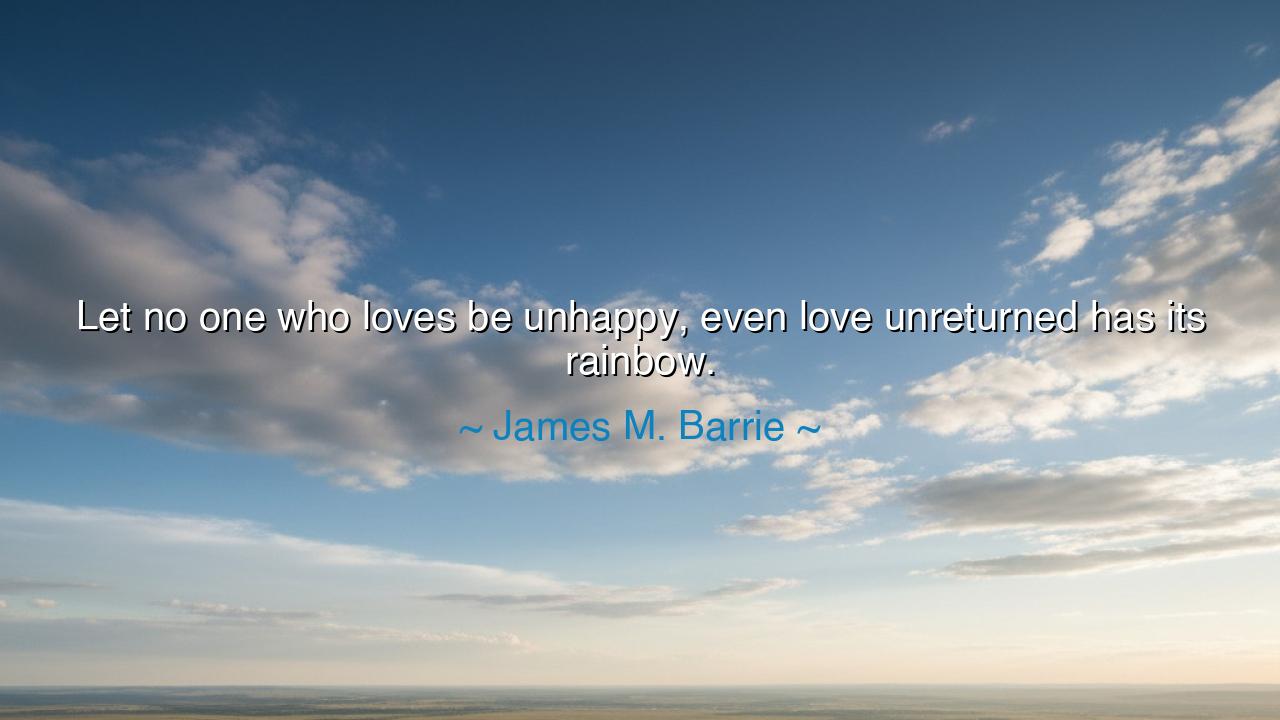
Let no one who loves be unhappy, even love unreturned has its






James M. Barrie, the beloved author of Peter Pan, speaks a truth in his words: “Let no one who loves be unhappy, even love unreturned has its rainbow.” These words remind us of the inherent joy in the act of loving, even when that love is not returned. The sacrifice of love, Barrie suggests, does not lead to despair but to a profound understanding of the beauty and growth that love brings into the heart. Even when love is not reciprocated, even when it is met with silence or indifference, there remains a rainbow, a glimmer of something beautiful that shines from within the lover’s soul. This is not a love that seeks validation, but a love that transcends its object and shines as a force of its own.
In the teachings of the ancients, love was often seen as the highest form of virtue, a force that carried a soul toward divinity and goodness. Plato and Aristotle both saw love as something that elevates the lover, regardless of whether it was returned in kind. Plato, in his Symposium, discussed how love is a yearning for the ideal, the good, and the beautiful, and how the pursuit of such love elevates the soul. Even if the physical love of another is not granted, the lover is still moved toward a greater understanding of truth, beauty, and selflessness. Aristotle spoke of love in terms of friendship, noting that a true friend loves not out of self-interest, but because the act of loving itself is its own reward. In this way, even unreturned love holds a deeper value that transcends the immediate fulfillment of one’s desires.
Consider, O children, the story of Orpheus and Eurydice, a tragic love that carries with it profound wisdom. Orpheus, the great musician, loved Eurydice with all his heart. After losing her to the realm of the dead, Orpheus descended into the underworld, determined to bring her back. Though his love was unreturned in the sense that Eurydice remained in death, his song, filled with grief and love, moved the gods themselves. In his journey, Orpheus found the power of love that transcends death. Though he ultimately lost Eurydice again, his love became eternal—a force that moved the heavens. The rainbow of his love was not found in the return of Eurydice, but in the divine recognition of his sacrifice and devotion.
In a more modern sense, consider the life of Martin Luther King Jr., whose love for humanity and justice was unwavering, even in the face of hostility and rejection. His love for his fellow man was not always returned in the way he hoped—his work was often met with resistance, and in the end, his life was taken by those who opposed his ideals. Yet, his love for equality and freedom did not falter. In fact, it was precisely because his love was selfless, because it was not contingent upon being returned, that his influence continues to ripple through time. The rainbow of his love was not in immediate rewards, but in the enduring change he brought to the world. King’s love, like the love Barrie speaks of, was a love that had its own beauty, its own light, regardless of whether it was immediately reciprocated.
Barrie’s wisdom offers a lesson for us all: love itself is a gift, one that transforms the giver, regardless of whether it is returned. True love does not depend on the actions of others. It does not seek validation or reward. Instead, love is an expression of the soul, a force that gives without the expectation of receiving. When we love, we grow, we learn, and we expand our capacity for empathy and understanding. Even in the face of unrequited love, we are not diminished; rather, we are enriched by the experience. There is beauty in loving purely, in giving without expectation, and that beauty shines forth even in the absence of reciprocity.
So, O children, take this lesson with you: love, love deeply, and let no one who loves be unhappy. Even if that love is not returned, let it not cause sorrow. Instead, look to the rainbow that emerges from the act of loving itself—the beauty, the peace, and the growth it brings into your life. Even when love seems to be unanswered, its effects are lasting, shaping not only the one you love but also yourself. Love because it is a force that changes the world, that lifts the heart, and that brings light even in the darkest of times. Do not let the absence of reciprocity make you bitter, for true love is a wellspring that replenishes itself, always giving and never truly diminishing. Let your heart be filled with love, and know that even if it is not returned, it has already given you the richest reward.






AAdministratorAdministrator
Welcome, honored guests. Please leave a comment, we will respond soon